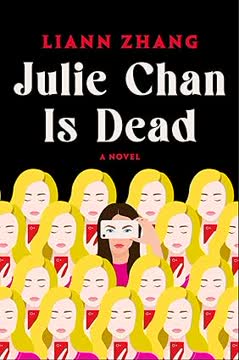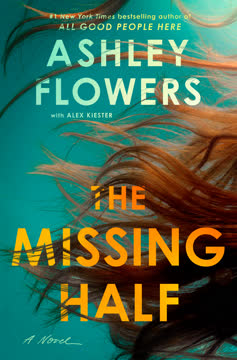Plot Summary
Twin Shadows, Split Lives
Julie Chan and Chloe Van Huusen are identical twins separated by tragedy and adoption. After their parents die in a car accident, Chloe is adopted by a wealthy white family and becomes a glamorous internet influencer, while Julie is raised by a resentful aunt in working-class obscurity. Their lives diverge: Chloe's is curated, privileged, and public; Julie's is invisible, marked by envy and longing. Julie's existence is haunted by her sister's digital shadow, a constant reminder of what she could have been.
Viral Reunion, Emotional Fallout
Chloe orchestrates a viral reunion with Julie, buying her a house and filming the event for millions of views. The gesture, meant to be generous, is ultimately exploitative—Chloe uses Julie as content, then ghosts her. Julie is left with a crumbling house and a viral video that cements her as a footnote in Chloe's narrative. The emotional fallout is acute: Julie's hope for reconnection is dashed, and she is forced to confront her own loneliness and the performative nature of online "family."
The Call: Mistake, Mistake
Years later, Julie receives a garbled, desperate call from Chloe, who seems to be in distress, repeating "mistake, mistake." The call is cut short, and Julie's attempts to reconnect are ignored. The ambiguity gnaws at her, reigniting old wounds and suspicions. When Chloe's social media goes silent, Julie's anxiety grows, propelling her to seek answers in person.
Ghosts in the Algorithm
Julie's investigation into Chloe's disappearance is filtered through the lens of social media as stage. She unblocks Chloe and discovers her sudden absence online, fueling speculation among fans. The digital breadcrumbs—comments, DMs, analytics—reveal both the scale of Chloe's influence and the emptiness behind the persona. Julie's sense of self blurs as she obsesses over her twin's curated life, feeling both invisible and exposed.
The Gift of Absence
Driven by dread and unresolved longing, Julie travels to Chloe's New York apartment. She navigates the trappings of her sister's luxury—security, PR packages, curated spaces—feeling like an imposter in a parallel universe. The apartment is both shrine and stage, filled with evidence of Chloe's success and isolation. Julie's search is both literal and existential: she is looking for her sister, but also for a sense of belonging.
The House That Wasn't Home
Julie finds Chloe's body, dead for days, behind the kitchen island. The shock is visceral and destabilizing. In the aftermath, Julie is forced to confront the reality of her sister's death, the performative nature of their last interactions, and the emptiness left behind. The house, a symbol of Chloe's "generosity," is revealed as a hollow gesture—just as their reunion was a performance for the internet.
Chloe's World, Julie's Orbit
In the chaos following Chloe's death, Julie is mistaken for her twin by police, neighbors, and even Chloe's assistant. The temptation to step into Chloe's life—her wealth, her following, her community—is overwhelming. Julie rationalizes the theft as karmic justice, a chance to finally belong. She assumes Chloe's identity, inheriting not just her assets but her obligations, relationships, and digital persona.
The Island Invitation
Julie, now living as Chloe, is swept into the inner circle of the Belladonnas—a clique of elite influencers led by the enigmatic Bella Marie. She receives a mysterious invitation to an exclusive island retreat, a tradition among the group. The trip is shrouded in secrecy, with coded RSVPs and an emphasis on "family." Julie is both thrilled and anxious, aware that she is an imposter among women who prize authenticity.
Belladonnas and the Queen Bee
On the island, Julie is immersed in a world of curated luxury, ritualized bonding, and subtle power plays. Bella Marie, the group's charismatic leader, orchestrates every detail, from the food to the group activities. The Belladonnas are both supportive and competitive, their friendships transactional and performative. Julie is drawn in by their acceptance but unsettled by their insularity and the cult-like atmosphere.
Rituals of Belonging
The retreat escalates from wellness activities to increasingly bizarre rituals. The group's "affirmations" and bonding exercises become mechanisms of control, eroding individual boundaries. Julie is pressured to participate in a series of escalating initiations—culminating in the consumption of a live mouse as a show of devotion to the group's mysterious god, Eto. The rituals are both absurd and horrifying, blurring the line between self-help and cult indoctrination.
Mice, Sacrifice, and Secrets
As Julie is drawn deeper into the Belladonnas' world, the true nature of their "family" is revealed. Each member has made a personal sacrifice to Eto in exchange for success—fertility, family, even firstborn children. The group's power is sustained by a cycle of offerings and secrecy. Julie learns that Chloe's own sacrifice was her adoptive parents, whose mysterious accident was no coincidence. The group's rituals are both a metaphor for and a literal enactment of the costs of influence.
The Burning of Family
When Iz, the only other outsider, is imprisoned for dissent, Julie realizes the danger she is in. She orchestrates a plan to drug the Belladonnas and sets fire to the bungalow, killing the group in a desperate act of self-preservation and vengeance. The act is both a literal and symbolic burning of the toxic "family" she once craved. Julie escapes, but not unscathed—her actions haunt her, and the line between victim and perpetrator blurs.
The Aftermath: Truths Unravel
Julie is arrested and charged with multiple murders, including Chloe's. The ensuing trial becomes a media spectacle, with the internet and public opinion playing as much a role as the legal system. The truth is slippery: Julie's story is both a confession and a performance, shaped by lawyers, journalists, and the court of public opinion. The Belladonnas' crimes are exposed, but so are Julie's.
The Trial of Julie Chan
Julie's defense hinges on her status as both victim and survivor—of family trauma, cult manipulation, and the toxic world of influence. Testimonies from other victims, including Viktor and Iz, corroborate her account of the Belladonnas' cult-like practices. The trial is as much about who controls the narrative as it is about facts. Julie's identity—Chloe, Julie, victim, killer—is contested and reframed.
The Internet's Judgment
As the trial unfolds, Julie becomes a cause célèbre online. The internet, hungry for spectacle and redemption, rallies around her. Documentaries, podcasts, and social media campaigns recast her as a liberator, a survivor, even a hero. The same platforms that once haunted her now offer validation and power. Julie's story is commodified, her trauma turned into content.
The Price of Influence
Julie is offered book deals, movie rights, and a new kind of influence. The world that once excluded her now clamors for her story. Yet the cost is steep: she is forever marked by violence, loss, and the knowledge that power is always transactional. The cycle of exploitation continues, even as she profits from it.
The Power of Us
Julie reflects on the nature of family, community, and influence. The Belladonnas' mantra—"We are family"—is revealed as both a promise and a threat. The desire to belong can be weaponized, and the line between support and control is razor-thin. Julie's journey is a cautionary tale about the dangers of seeking validation in systems designed to consume and discard.
I Did Not Kill My Twin
In the end, Julie addresses her audience directly: "One thing needs to be made clear: I did not kill my twin sister." The statement is both a denial and an assertion of agency. The truth is ambiguous—Julie is both victim and perpetrator, shaped by forces beyond her control and by her own choices. The story ends with Julie reclaiming her narrative, but the cost of survival remains unresolved.
Characters
Julie Chan
Julie is the narrator and emotional core of the novel—a woman defined by absence, envy, and longing. Raised in poverty and neglect, she is haunted by her twin's success and the sense that she is a failed version of Chloe. Julie's psychology is marked by self-loathing, hunger for validation, and a deep need for family. Her journey from victim to imposter to survivor is fraught with moral ambiguity: she both envies and resents Chloe, ultimately stepping into her life out of desperation. Julie's development is a study in the corrosive effects of comparison, the dangers of seeking belonging at any cost, and the blurry line between self-preservation and complicity.
Chloe Van Huusen
Chloe is Julie's identical twin and foil—a woman who has mastered the art of self-presentation, turning her trauma into content and her life into a brand. Adopted by a wealthy family, Chloe's existence is both enviable and hollow. She is skilled at performance, using generosity as a tool for influence, but is ultimately isolated and consumed by the demands of her audience and the Belladonnas. Chloe's psychology is complex: she is both victim and perpetrator, shaped by loss, privilege, and the need to be seen. Her death is the catalyst for Julie's transformation and the unraveling of the Belladonnas' world.
Bella Marie
Bella Marie is the enigmatic head of the Belladonnas, a woman whose beauty, wealth, and charm mask a ruthless need for control. She orchestrates the group's rituals, enforces loyalty, and manipulates vulnerability for her own ends. Bella Marie is both cult leader and influencer, using affirmation and love-bombing as tools of domination. Her psychology is marked by narcissism, a hunger for power, and a belief in her own myth. She is both mother and monster, offering belonging at the price of autonomy.
The Belladonnas (Kelly, Ana, Maya, Sophia, Lily, Emmeline, Angelique, Iz)
The Belladonnas are a rotating cast of elite influencers, each with their own niche (beauty, fitness, motherhood, etc.), but united by their dependence on Bella Marie and the group's rituals. They are both victims and enforcers, complicit in the group's abuses and eager for the rewards of belonging. Their relationships are transactional, marked by competition, jealousy, and performative support. Each woman's psychology is shaped by trauma, ambition, and the need to be seen—making them both sympathetic and culpable.
Iz (Isla Harris)
Iz is the only other woman on the island who resists the Belladonnas' control. A single mother and influencer of color, she is both drawn to and repelled by the group's power. Iz's skepticism and refusal to conform make her a target, but also a catalyst for Julie's awakening. She represents the possibility of resistance, but also the cost of dissent in systems built on complicity.
Viktor
Viktor is the island's caretaker and the Belladonnas' sexual plaything—a man raised in isolation, indoctrinated to serve. His psychology is marked by confusion, dependency, and a desperate need for validation. Viktor's loyalty is easily manipulated, making him both a victim and a tool in Julie's escape. His fate is a commentary on the collateral damage of systems built on exploitation.
Julie's Aunt
Julie's aunt is a minor but pivotal character—a woman whose resentment and cruelty shape Julie's sense of self. She is both a product and perpetuator of trauma, using Julie as a scapegoat for her own disappointments. Her later blackmail of Julie is both a literal and symbolic extension of the novel's themes: family as both refuge and prison.
Fiona
Fiona is Chloe's (and later Julie's) assistant—a woman who navigates the influencer world with pragmatism and self-interest. She is both supportive and transactional, helping Julie maintain the illusion of Chloe's life while also protecting her own interests. Fiona's role highlights the machinery behind the influencer persona and the ways in which support staff are both enablers and survivors.
Jessica Peters
Jessica is the only outsider who comes close to exposing the Belladonnas' secrets. As a journalist, she represents the possibility of accountability, but is ultimately thwarted by the group's power. Her presence is a reminder of the limits of truth in a world built on performance and secrecy.
The Van Huusens
Chloe's adoptive parents are both symbols and victims—representing the privileges and costs of assimilation, and ultimately sacrificed in the group's rituals. Their fate is a commentary on the expendability of family in systems built on transactional relationships.
Plot Devices
Duality and Mirroring
The novel's central device is the twin relationship—Julie and Chloe as mirrors, doubles, and opposites. Their lives are shaped by the same trauma but diverge through circumstance, privilege, and choice. The mirroring extends to the influencer world, where identity is both curated and unstable, and to the Belladonnas, whose rituals are both bonding and erasing. The device is used to explore questions of authenticity, envy, and the hunger for belonging.
Social Media as Stage
The narrative is filtered through the lens of social media—comments, DMs, analytics, and viral moments. The internet is both a source of validation and a tool of control, shaping identity and amplifying trauma. The performative nature of online life is mirrored in the Belladonnas' rituals, where affirmation and love-bombing are used to enforce conformity. The device is used to critique the commodification of self and the dangers of seeking community in systems built on spectacle.
Cult Dynamics and Ritual
The Belladonnas' world is structured around rituals of belonging—affirmations, sacrifices, and escalating initiations. The group's power is sustained by cycles of offering and secrecy, with Eto as both metaphor and literal god. The cult dynamics are used to explore the psychology of groupthink, the costs of acceptance, and the ways in which vulnerability can be weaponized.
Unreliable Narration and Ambiguity
Julie's narration is both confessional and performative—she is both seeking truth and shaping her own story. The novel plays with ambiguity: Did Julie kill Chloe? Is Eto real? Are the Belladonnas victims or villains? The unreliable narration is used to explore the slipperiness of truth in a world built on performance, and the ways in which survival often requires complicity and self-deception.
Metafiction and Media
The novel is self-aware about its own status as content—Julie's story is turned into documentaries, podcasts, and movies. The commodification of trauma is both a plot device and a theme, raising questions about who gets to tell the story, who profits, and what is lost in the process.
Analysis
Julie Chan Is Dead is a razor-sharp, darkly comic exploration of identity, belonging, and the toxic allure of internet fame. Through the lens of estranged twins, influencer culture, and cult dynamics, Liann Zhang dissects the hunger for validation in a world where selfhood is both a commodity and a performance. The novel is both a satire and a psychological thriller, exposing the ways in which trauma, envy, and the desire for family can be weaponized by systems built on spectacle and control. At its core, the book is a meditation on the costs of survival: the sacrifices we make to belong, the violence required to escape, and the impossibility of returning to innocence. In a world where the line between victim and perpetrator is blurred, and where the internet's judgment is both fickle and absolute, Julie's story is a cautionary tale about the dangers of seeking meaning in systems designed to consume and discard. The final, ambiguous confession—"I did not kill my twin sister"—is both a denial and an assertion of agency, leaving readers to grapple with the uncomfortable truth that sometimes, the only way to survive is to become the very thing you once feared.
Last updated:
FAQ
Synopsis & Basic Details
What is Julie Chan Is Dead about?
- Estranged twins, divergent lives: The novel follows Julie Chan, living in obscurity and resentment, haunted by the glamorous online life of her identical twin sister, Chloe Van Huusen, who was adopted into wealth after their parents' death.
- Viral reunion, bitter aftermath: Chloe orchestrates a public reunion for her YouTube channel, buying Julie a house but then abandoning her, leaving Julie feeling exploited and more isolated than before.
- Identity theft and dark secrets: When Chloe mysteriously dies, Julie assumes her twin's identity, stepping into a world of elite influencers and uncovering disturbing secrets, including a cult-like group led by the enigmatic Bella Marie.
Why should I read Julie Chan Is Dead?
- Sharp social commentary: The book offers a biting critique of influencer culture, the performance of authenticity, and the commodification of trauma in the age of social media.
- Psychological depth and suspense: It delves into themes of identity, envy, and the desperate human need for belonging, wrapped in a propulsive thriller narrative with unexpected twists.
- Exploration of complex morality: The protagonist's journey from victim to imposter to something far darker challenges readers to grapple with difficult questions about survival, complicity, and justice in a morally ambiguous world.
What is the background of Julie Chan Is Dead?
- Cultural context of adoption: The story is rooted in the differing experiences of identical twins separated by adoption, highlighting disparities in upbringing based on race, class, and family structure.
- Early 2010s internet culture: The author dedicates the book to "early 2010 internet personalities," reflecting the era when YouTube and influencer culture began to shape identity and connection.
- Critique of performative philanthropy: The narrative implicitly questions the motivations behind highly publicized acts of generosity, particularly within the influencer space, suggesting they can be tools for exploitation.
What are the most memorable quotes in Julie Chan Is Dead?
- "One thing needs to be made clear: I did not kill my twin sister.": This opening line immediately establishes the central mystery and the narrator's contested innocence, setting a tone of ambiguity and self-justification.
- "Being angry and envious is better than being empty.": Julie's raw confession reveals the depth of her emotional pain and the destructive coping mechanisms she developed in response to her perceived failures and loneliness.
- "We are family.": This recurring mantra, initially presented as a sign of belonging and support within the Belladonnas, gradually takes on a chilling, coercive meaning, highlighting the manipulative nature of the group.
What writing style, narrative choices, and literary techniques does Liann Zhang use?
- First-person, confessional narration: The story is told from Julie's perspective, offering intimate access to her thoughts and feelings, but also making her an unreliable narrator whose self-justifications color the events.
- Dark humor and satire: Zhang employs a darkly comedic tone, particularly in her portrayal of influencer culture and the absurdity of the Belladonnas' rituals, using satire to critique societal values.
- Psychological thriller pacing: The narrative builds tension through escalating revelations, moments of panic, and a blurring line between reality and delusion, keeping the reader off-balance alongside the protagonist.
Hidden Details & Subtle Connections
What are some minor details that add significant meaning?
- The Rat in New York: Julie's encounter with a large, well-fed rat outside Chloe's luxurious building subtly highlights the stark contrast between their lives and Julie's own struggles, making her feel "shamed" by the world's unfairness.
- Chloe's Chewed Nails: Julie notes Chloe's "soft, pliable" hands with "sharp, shellacked nails," contrasting them with her own "chewed down to raw skin," a small detail symbolizing Julie's anxiety and labor-filled life versus Chloe's effortless privilege.
- The Multifaith Prayer Room: Julie's brief stop in the hospital prayer room after arranging Chloe's cremation, seeking a sign from any deity, underscores her desperation for meaning and forgiveness, even as she commits a profound act of deception.
What are some subtle foreshadowing and callbacks?
- The "Mistake" Call Echoes: Chloe's garbled phone call repeating "mistake, mistake" foreshadows the later revelation that she believed the Van Huusens' accident was her fault, hinting at a deeper connection between her sacrifice and their fate.
- Nikolai's One Blue Eye: The painting of Nikolai Melniburg with a bandaged eye, explained as a sacrifice for luck, subtly foreshadows the Belladonnas' ritualistic sacrifices and the physical costs associated with their pursuit of power.
- The Crumbling House Groaning: Julie's description of her house groaning "Ju-Ju" like Chloe's voice foreshadows the later haunting visions of Chloe's corpse and the psychological weight of her twin's death and stolen identity.
What are some unexpected character connections?
- Chloe and Viktor's "Thing": The revelation that Chloe and Viktor had a recurring sexual relationship ("our thing") after wood chopping is an unexpected detail that humanizes Viktor and adds a disturbing layer to Chloe's life on the island, suggesting a hidden intimacy or exploitation.
- Bella Marie's Mother's Captivity: The discovery that Bella Marie's mother is not just elderly and ill but potentially held captive on the island ("Go! Run! Leave before they get you too!") reveals a darker side to the Melniburg family dynamics and the island's true nature, extending the theme of imprisonment beyond Iz.
- The New Yorker Journalist Connection: Chloe's secret contact with Jessica Peters, a journalist from The New Yorker, to tell a story involving her adoptive parents, reveals Chloe's attempt to expose the truth about the Van Huusens and the Belladonnas, highlighting her hidden rebellion before her death.
Who are the most significant supporting characters?
- Iz (Isla Harris): As the only other newcomer who resists the Belladonnas' groupthink and manipulation, Iz serves as a crucial foil to Julie, representing a different path of dissent and ultimately becoming the catalyst for Julie's escape and exposure.
- Viktor: More than just a servant, Viktor is a product of the island's indoctrination and exploitation, serving as a witness to the Belladonnas' rituals and sacrifices, and later becoming a key figure in the public narrative of the cult.
- Julie's Aunt: Though physically absent for much of the story, her past abuse and present blackmail serve as a constant reminder of Julie's trauma and desperation, driving her financial motivations and highlighting the cyclical nature of family dysfunction and exploitation.
Psychological, Emotional, & Relational Analysis
What are some unspoken motivations of the characters?
- Chloe's Apology Call: Chloe's final, garbled call repeating "mistake" and "I'm sorry" suggests a possible unspoken motivation of regret or a last-ditch attempt to confess or apologize to Julie for her past exploitation, perhaps triggered by her impending death or the consequences of her sacrifice.
- The Belladonnas' Need for Control: Beyond wealth and influence, the Belladonnas' intense need for group synergy and control over newcomers like Julie and Iz suggests an unspoken motivation rooted in maintaining their shared delusion and power structure, perhaps fearing exposure or the unraveling of their reality.
- Julie's Desire for Validation: While Julie claims to seek justice for Chloe, her actions are heavily driven by an unspoken, deep-seated need for validation and acceptance, stemming from her abusive childhood and Chloe's abandonment, making her susceptible to the Belladonnas' love-bombing.
What psychological complexities do the characters exhibit?
- Julie's Dissociation and Blurring Identity: Julie exhibits psychological complexities including dissociation, where her identity blurs with Chloe's, and a complex mix of envy, grief, and self-justification that allows her to rationalize her actions, highlighting the fragility of selfhood under extreme pressure.
- Chloe's Hidden Struggles: Despite her curated online persona of perfection, Chloe's use of Elavil (often for depression), history of "tantrums," and potential suicidal ideation revealed through the wellness check callback suggest significant hidden psychological struggles beneath the surface.
- The Belladonnas' Groupthink and Delusion: The Belladonnas exhibit psychological complexities related to groupthink, shared delusion (regarding Eto), and a disturbing lack of empathy (watching Angelique's video, imprisoning Iz), suggesting a collective psychological break or indoctrination that overrides individual morality.
What are the major emotional turning points?
- The Discovery of Chloe's Body: Finding Chloe's corpse is a major emotional turning point for Julie, triggering intense shock, nausea, and a primal fear, but also paradoxically opening the door to her decision to assume Chloe's identity out of desperation and a twisted sense of opportunity.
- Bella Marie's Acceptance of Julie: Bella Marie's declaration of acceptance ("We accept you, Julie") after revealing they knew her true identity is a pivotal emotional turning point, providing Julie with the profound sense of belonging she craved, momentarily overriding her fear and guilt.
- Witnessing Angelique's Miscarriage Video: Watching the Belladonnas' callous reaction to Angelique's heartbreaking miscarriage video is a critical emotional turning point for Julie, shattering her idealized view of the group and revealing their disturbing lack of empathy, prompting her rebellion.
How do relationship dynamics evolve?
- Julie and Chloe's Shifting Bond: The relationship between Julie and Chloe evolves from childhood closeness to estranged resentment, then to Julie's obsessive longing, culminating in Julie literally embodying her twin, a twisted evolution of their mirrored identities.
- Julie's Relationship with the Belladonnas: Julie's dynamic with the Belladonnas transforms from cautious impersonation and a desire for acceptance to feeling genuine belonging and love within the group, before finally devolving into horror, betrayal, and violent rejection.
- Bella Marie and the Belladonnas' Control Dynamic: Bella Marie's relationship with the Belladonnas is revealed to be one of manipulative control disguised as familial love, where vulnerability is exploited, loyalty is enforced through rituals and threats, and individual autonomy is suppressed for the sake of group power.
Interpretation & Debate
Which parts of the story remain ambiguous or open-ended?
- The Reality of Eto: The nature of Eto remains ambiguous; it's unclear if it's a genuine supernatural entity, a shared mass psychosis induced by drugs and manipulation, or a combination, leaving the reader to question the source of the Belladonnas' power and Julie's perceived connection.
- Chloe's True Intentions: Chloe's final motivations remain open-ended; while Julie interprets her call as an apology and a warning about Bella Marie, the ambiguity of her words and actions before death leave room for debate about her true feelings towards Julie and her reasons for contacting her.
- Julie's Final Statement: Julie's closing line, "I did not kill my twin sister," is highly ambiguous; it could be a literal truth (she died from the overdose), a legal strategy for her trial, a psychological denial of her complicity, or an assertion that her actions were a consequence of Chloe's choices and the Belladonnas' influence, not a direct murder.
What are some debatable, controversial scenes or moments in Julie Chan Is Dead?
- The Mouse Eating Ritual: The scene where the Belladonnas, including Julie, eat live mice is highly controversial and disturbing, sparking debate about the limits of cult indoctrination, the psychological impact of extreme rituals, and the lengths characters will go for acceptance and power.
- Angelique's Miscarriage as Sacrifice: The interpretation that Angelique sacrificed her baby to Eto for fame is a deeply controversial moment, forcing readers to confront the horrific potential costs of the Belladonnas' beliefs and the disturbing commodification of even the most profound human experiences.
- Julie's Justification for Murder: Julie's internal justifications for killing the Belladonnas, framing it as justice or self-preservation against a dangerous cult, are debatable; readers must weigh her trauma and the group's actions against the moral implications of her violent act.
Julie Chan Is Dead Ending Explained: How It Ends & What It Means
- The Fire and Escape: The novel culminates in Julie drugging the Belladonnas and setting fire to their bungalow on the island, killing them in a violent act of rebellion and escape from the cult's control. Iz, freed by Julie, calls for help, leading to Julie's rescue and arrest.
- Trial and Public Narrative: Julie is charged with multiple murders, including Chloe's. Her defense team leverages the exposed cult activities and Viktor's testimony to frame her as a victim and liberator. The trial becomes a media spectacle, with public opinion online largely siding with Julie.
- Ambiguous Vindication and New Fame: Julie is conditionally released and becomes a viral sensation, offered lucrative deals to tell her story. The ending leaves her fate in the legal system uncertain but shows her achieving a new level of fame and influence, albeit one built on tragedy and violence, while maintaining her claim that she did not kill Chloe. The meaning is complex: Julie survives and gains power, but at a profound moral cost, highlighting the novel's themes of transactional relationships, the nature of truth in the digital age, and the cyclical nature of exploitation.
Review Summary
Julie Chan Is Dead receives mixed reviews, with many praising its dark humor, sharp commentary on influencer culture, and compelling plot twists. Readers find the first half engaging, but opinions diverge on the second half's shift to a more surreal, cult-like narrative. Some appreciate the unhinged nature, while others find it jarring. The book is frequently compared to "Yellowface" and "Bunny." Despite polarizing reactions, most agree it's a page-turner that offers thought-provoking insights into social media's impact on identity and society.
Similar Books
Download PDF
Download EPUB
.epub digital book format is ideal for reading ebooks on phones, tablets, and e-readers.











